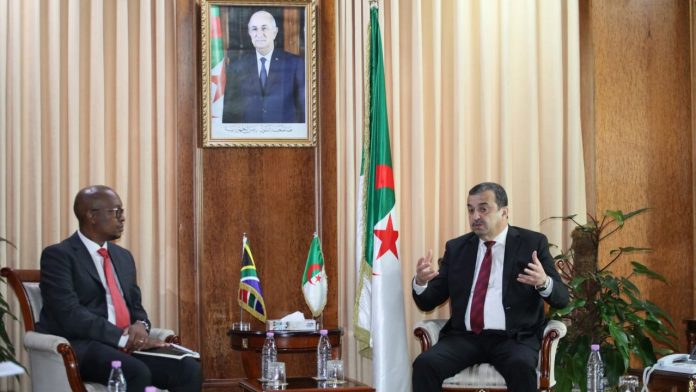Mining Other

Algeria expands strategic ties with Russia to advance mining, nuclear, and clean energy projects

By: Africa Sustainability Matters
Algeria and Russia opened a focused channel for expanded cooperation across hydrocarbons, mining, renewable energy and peaceful nuclear applications during talks at the Intra-African Trade Fair (IATF 2025), a move that reflects both countries’ intent to translate strategic ties into concrete energy and industrial projects. Algerian Minister of State Mohamed Arkab and Russian Deputy Minister of Energy Roman Marshavin discussed project-level collaboration that ranges from Sonatrach–Gazprom exploration and field development to green hydrogen, photovoltaic deployment and regional electricity interconnections. The meeting also covered scientific cooperation with Rosatom on medical and industrial nuclear applications, signaling a multi-vector agenda that blends near-term resource development with longer-term low-carbon planning.
Algeria’s state energy company has been active in refreshing its upstream portfolio and pursuing partnerships that can accelerate both hydrocarbon output and energy transition projects. Recent bid rounds and contract signings underline the government’s dual objective of attracting investment into exploration while preparing the industrial base for lower-carbon value chains. Parallel memoranda and feasibility studies with international partners on green hydrogen and power-to-X illustrate a strategy to leverage abundant solar and gas resources to produce exported derivatives and domestic industrial feedstocks. Those dynamics provide a practical context for the Sonatrach–Gazprom conversations, which officials framed as opportunities to combine technical expertise, financing and operational capacity.
Commitments on green hydrogen occupy an increasingly prominent place in Algeria’s energy diplomacy. Algerian industry and international developers have advanced several feasibility studies and pilot projects aimed at producing hydrogen from renewables for local industry and export markets, especially in Europe. Joint ventures that pair local resource advantages with foreign engineering and offtake relationships seek to convert Algeria’s solar and wind potential into tradeable, low-carbon molecules. Achieving that outcome will depend on building electrolysis capacity at scale, securing green electricity at competitive rates, and establishing the measurement and certification frameworks necessary for credible cross-border supply.
Nuclear cooperation with Russia introduces an additional technical strand. Rosatom and Algeria’s Atomic Energy Commission have already outlined a roadmap for collaboration on research reactors, radiopharmaceutical production and technical training. Such work stretches beyond electricity generation into health-sector applications and specialized industry, areas where local manufacturing of equipment and skills development could produce downstream industrial benefits if governance and safety frameworks are rigorously applied. The inclusion of radiopharmaceuticals in the talks reflects a pragmatic orientation toward immediate public-health dividends rather than an exclusive focus on long-term nuclear power deployment.
Renewable energy ambitions and industrialization plans are proceeding alongside Algeria’s role as a regional energy supplier. The country has stepped up solar capacity targets and made moves to localize solar panel assembly and production, positioning itself to capture more of the upstream value chain of renewables. Electricity interconnection with neighboring markets and export routes to Europe remain policy priorities, while existing gas infrastructure such as the Medgaz pipeline has already been central to Algeria’s recent export growth to Spain. Coordination between export-oriented projects and domestic decarbonization goals will be a central challenge for policymakers and investors.
Geopolitical and market conditions frame the feasibility of expanded cooperation. Algeria and Russia reaffirmed their shared interest in oil and gas-market stability within OPEC+, a platform whose recent production decisions are reshaping near-term supply dynamics and investment calculus. Those market developments affect the economics of gas-to-hydrogen pathways and the timing of private capital flows into major projects. Investors and project sponsors will be looking for clear regulatory regimes, transparent procurement processes and predictable timelines for accreditation and offtake if technical plans are to become bankable.
The discussions at IATF 2025 therefore combine immediate commercial objectives with an effort to diversify the technical foundations of Algeria’s energy sector. Implementation will require coordinated project pipelines, capacity building for specialized manufacturing and stringent safety and environmental standards where nuclear and industrial hydrogen production are involved. Observers and stakeholders in Africa’s energy transition should monitor how these dialogues move from ministerial statements to signed contracts, pilot deployments and accredited facilities; that conversion will determine whether strategic partnership elevates Algeria’s role in a rapidly changing regional energy map or remains a sequence of exploratory accords.












